剑桥国际商务英语第1课
剑桥商务英语初级Unit1a
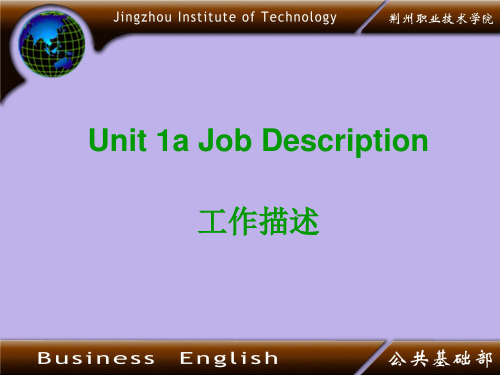
Business Card
accountant 会计 The accountant described his work to the sales staff. 那个会计向营业部的职员介绍了自己的工作情况.
Conversation 4
• TK: Tell me, does your consultancy work with big companies? • BL: No, we do the accounts for small and medium-sized companies. • TK: Ah, I see. Do you have clients in London? • BL: Some but not many. Most of our clients are in Reading.
Conversation 1
• RS: So, are you from London then – or just here for the meeting? • KW: No, I’m not from London, but my company has offices here. • RS: What kind of company is it? • KW: I work for an IT company. I’m a consultant.
Business Card
sales executive: 主管,管理人员”或“经理” The president of a company is an executive. 公司的经理是公司的管理者。 邮件地址的读法: 地址里边@的这个字符读at, 后边的“· ”读成dot.
Conversation 3
Business Card
剑桥国际英语教程《一》-Unit1-Please-call-me-Beth公开课课件省市一等奖完整版

※ Other Sentence Structures
1. Where are you from? 2. How about you?
What about you? And you? 3. Who is …? 4. What’s your last/first name again? 5. How do you spell that?
Listen and check the answer:
1. I‘m sorry. What’s your name again? _b__
2. What do people cHow do you spell your last name? _a__
a. S-I-L-V-A.
It’s Sun Hee Park. 2. Where is she from?
She is from Korea.
First name(名) Last name(姓)
Elizabeth David
Silva Garza
Match the questions with the response.
My name is …, but please call me …
I am …, but my friends call me… e.g. Her name is
Nicole Mary Kidman,
but her friends always call her Nikki.
※ So is Brazil!
Close your book. Listen and answer the questions:
剑桥国际商务英语教案

New international business EnglishLesson One Face to Face1.1 first impressions (1st class)Note: situation analysis1. your role, you are a visitor, you are a stranger for the people greeting you, you meet them for the first time.2. the place, now you are in an office , a business situation and this office is an unfamiliar office3. these people greeting you, the visitor, are not all the receptionist, some are people who happen to be in the office when you arrive.A.1. self- introduction under business situation (you’re not a student any more, you’re an export clerk, secretary, or sales manager and so on). 5 Sts2. let’s look at these pictures, these pictures show us different expressions of different people. Could you answer 2 questions of PPT just according to their expressions on their faces?1) Which person seems the most welcoming?The person of picture 3 and picture 10. Because they smile so pleasantly, sincerely, and friendly 2) Which person seems the most unfriendly?The person of picture 5 and 9. Because the person of picture 5 seemingly would not like to see you, moreover looks like so indifferent, impatient. And the one of picture 9 looks so off-hand, and unhelpful.From this, we can know expression is vital of the first impression, without saying any word, you can give a good or bad first impression on people. So nice smile and friendly eye contact are the most important things if you want to give a good first impression on other people.B.Then l et’s listen to the recording, the order of the recording is the same as the order of the picture, from the one to ten.Discuss the questions of PPT.1. The man in extract 5 says things so quickly and shortly, and the tone of his voice make him seemingly be rude. He is brusque/abrupt.The woman in extract 9 sounds off-hand, indifferent or causal. And language: YES? WHO? Informal language. All makes her particularly impolite2. the language they use. We had better use the formal language. The tone of voice, we’d better use the tone which makes our voice sound friendly, hospitable.If you are greeted by the woman in extract 9, you’re sure be given a bad first impression by the woman, so as to give a bad impression on the company’s image.Giving a good impression reflects your company’s image(no company wants its customers to think it’s unpleasant)If you start off a relationship in a friendly, pleasant way, it’s likely to go on in the same way, which will be to every one’s advantage.C.I hear they’re calling for thunder storms all weekend。
剑桥商务英语初级第1课学习
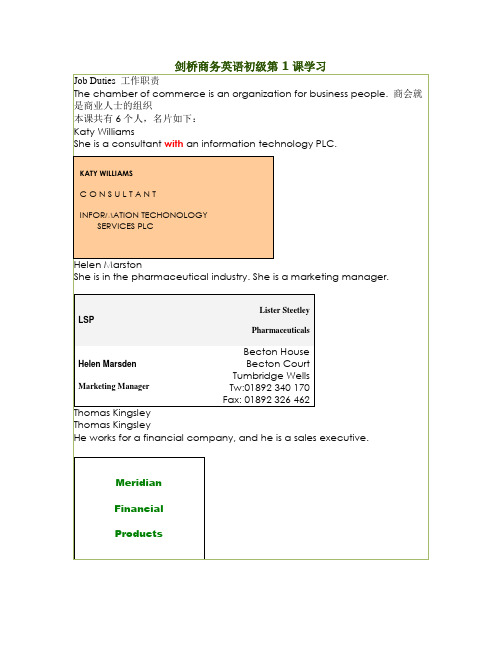
剑桥商务英语初级第 2 课学习
一,原文 Job Description of Helen Marsten and Robin Seaton
Helen Marsden: Job description
1. 2. 3. 4. 5. 6. Work for a company that produces vaccines and sells them to doctors Discusses new products with doctors Deals with designers and printers Deals with the health authorities in central Europe Travels a lot Organize conferences for the medical press.
KATY WILLIAMS
CONSULTANT INFORMATION TECHONOLOGY SERVICES PLC
Helen Marston She is in the pharmaceutical industry. She is a marketing manager.
Lister Steetley LSP Pharmaceuticals
Richard Saunders He is a production manager.
REGAL FROZEN PRODUCT 105-109 Valley Road, Staines Middlesex,ST12 4JW Tele:01784 933 6525 Robin Seaton Fax: 01784 933 6522 She is a human resources manager.
Helen Marsden Marketing Manager
剑桥商务英语培训课程第一讲

Unit 1a Job description
Objectives: To enable Ss to talk about jobs To practice listening for specific information To review the present simple (She works in Finance Department)
Unit 1 introduce yourself
1. tell your name , job and company e.g. My name is … I am a … I report to …. I work for …. Our company manufactures… We have offices in…
Conversation 3 K: so what kind of products do you sell? T: anything that helps people make money. K: how do you mean? T: Financial services. I sell investment products. Conversation 4 T: tell me, does your consultancy work with big companies? B: no, we do the accounts for small and medium-sized companies. T: Ah, I see. Do you have clients in london? B: some but not many. Most of our clients are in Reading.
Introduction
剑桥国际英语教程1unit1
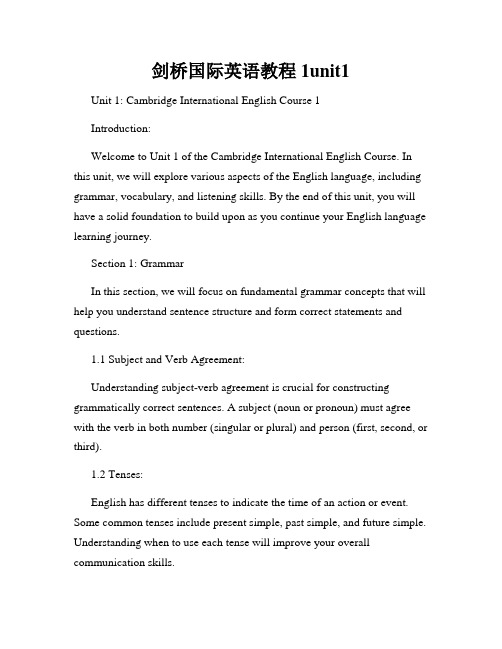
剑桥国际英语教程1unit1Unit 1: Cambridge International English Course 1Introduction:Welcome to Unit 1 of the Cambridge International English Course. In this unit, we will explore various aspects of the English language, including grammar, vocabulary, and listening skills. By the end of this unit, you will have a solid foundation to build upon as you continue your English language learning journey.Section 1: GrammarIn this section, we will focus on fundamental grammar concepts that will help you understand sentence structure and form correct statements and questions.1.1 Subject and Verb Agreement:Understanding subject-verb agreement is crucial for constructing grammatically correct sentences. A subject (noun or pronoun) must agree with the verb in both number (singular or plural) and person (first, second, or third).1.2 Tenses:English has different tenses to indicate the time of an action or event. Some common tenses include present simple, past simple, and future simple. Understanding when to use each tense will improve your overall communication skills.Section 2: VocabularyBuilding your vocabulary is essential for effective communication. In this section, we will explore strategies to expand your word bank and improve your language proficiency.2.1 Word Families:Word families consist of a base word and its related forms (nouns, verbs, adjectives, adverbs). Learning word families helps you understand how words are connected and how their meanings can be extended.2.2 Synonyms and Antonyms:Knowing synonyms (words with similar meanings) and antonyms (words with opposite meanings) allows you to express yourself more precisely and avoid repetition in your speech and writing.Section 3: Listening SkillsDeveloping your listening skills is crucial for engaging in conversations and understanding native speakers. In this section, we will provide strategies to enhance your listening abilities.3.1 Active Listening:Active listening involves focusing on the speaker, paying attention to verbal and nonverbal cues, and understanding the main ideas and supporting details. Practicing active listening will improve your overall comprehension skills.3.2 Note-Taking:Taking notes while listening helps you retain information and review key points later. Develop a system that works for you, whether it's using bullet points, diagrams, or abbreviations.Conclusion:Congratulations on completing Unit 1 of the Cambridge International English Course. By focusing on grammar, vocabulary, and listening skills, you have taken significant steps towards improving your English language proficiency. Remember to practice regularly and apply what you have learned in real-life situations. Good luck on your language learning journey!。
新剑桥商务英语(高级) Unit 1
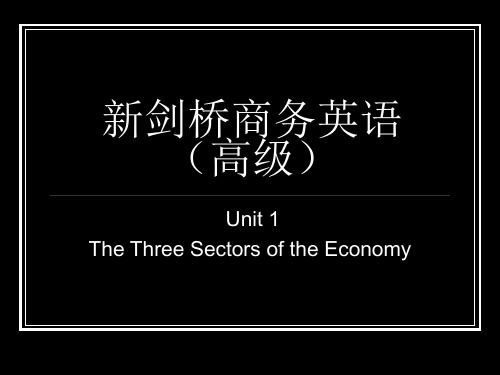
Unit 1 The Three Sectors of the Economy
1b Key words and Expressions Produce electricity (=generate power发电) Mining of coal (煤矿开采) Pumping of oil (用泵抽取石油) Fuel (提供燃料) the generator (发电机) Laying of miles of cable (铺设几英里的电缆) carry the current (电流) to … (输送电力到。。。)
Unit 1 The Three Sectors of the Economy
1b Key words and Expressions Slide v. (滑行) Printed circuits(印制电路) Scatter v. (散布;四散开来) mosaic (镶嵌) Wires of (如同金属丝/电线一般) motorways (=speedways高速公路)
Unit 1 The Three Sectors of the Economy
1b What is the key point that this extract is making about economies? Answer: The text suggests(=gives hints暗示) that most people take for granted(想当然) the amazing complexity(复杂性) of the economic infrastructure(基础设施).
Unit 1 The Three Sectors of the Economy
2 Manufacturing and Services Key words and expressions: Loss(损失) Depend on (=count on依赖;取决于) To the extent (达到。。。的程度) Concern about (=care about关心;关注)
新编剑桥商务英语unit_1

Listening
1.You will hear a woman called Michela talking about working from home.
1) What does she say is important when working from home?
Have a timetable and stick to it.
gives you your days free more free time
you need to be good at self-organization need to coordinate with other person tiring
less money
temping
lots of variety
(4) __S_e__t _y_o_u_r__li_m__it_s____
Manager should clarify what they expect in terms of hours, availability and results, and employees should manage their employer’s expectations. Sue Osborn, a jobsharer for 21 years, says, ‘We’re often asked to do five-day weeks. Eventually you just have to say no.’
B You sell your work or services to a number of different companies.
1 teleworking 2 job-sharing 3 shift-work
新编剑桥商务英语(初级)unit one. 1 A

I. Revision on new words
• • • • • • • • • one-to -one 一对一的 accredited adj. 公认的 motivational adj. 激发积极性的, client n. 客户 entertaining adj. 有趣的,使人愉快的, professional adj. 专业的,职业的 involve vt. 包含、需要、使成为必要部分 responsibility n. 责任,所负责的事情 be responsible for sb./ sth. 对某人/某事负 责
2. Expressions of frequency: once a week, twice a month, every Monday, on Thursdays. These usually go at the end of the sentence.
频率副词在句子中的位置:动词前be 动词后
Homework
• Copy the new words and phrases • Finish the exercises on pg 8
工作场所的健康和安全 如何做印象深刻的阐述 如何应对难缠的顾客 公共场合演讲
快速阅读和记忆的超强训练
What kind of courses do you like? Why?
Match the jobs with the definitions
An author
A speaker A trainer A consultant • A. Someone who talks at a public event. • B. someone who helps people to improve at a sport, skill or school subject. • C. someone who advises people on a particular subject. • D. someone who writes books or articles .
剑桥商务英语 Unit 1

7
International Business English
B Listening
To have an appointment with sb. Is Mr. Grady in yet? Is everything ready yet?
8
International Business English
Listen to the recording three times and answer the questions
Why did some speakers sound more friendly or efficient than others? Was it the language they used or their tone of voice or what? The man in extract 5 and the woman in extract 9 are particularly impolite.
What can you say concerning small talks?
a. I’ve been looking forward to meet you. b. Did you have a good journey? c. When did you actually arrive? d. It must be a couple of years since we last met. e. Can you tell me something about your hometown? f. Do you like playing foot ball? g. Where do you come from in Argentina? h. What do you think of Guangzhou’ weather? i. Do you need any help? j. Where are you staying? k. Is this your first visit to…? l. How is your family? m. Whereabout do you come from in…?
剑桥国际英语教程《一》Unit1-Please-call-me-ChuckPPT课件一等奖新名师优质

Words and expressions
1. How is everything? ( informal) = How are you? / How’s everything going? 2. Not bad.( informal) = Pretty good./ I’m fine. 3. on vacation = in holidays 4. Engineering = the science or profession
first name
last name
given name family name
Charles Elizabeth
Chuck Liz
1. How do you pronounce your last name? 2. Excuse me, what’s your first name again? 3. How do you spell your last name? 4. What do people call you?
sometimes give one kiss on the cheek.
(They actually “kiss the air”). 面颊 实际上
Translation:
Sentences
问候,打招呼 男性
Women also greet both male and female friends with a kiss.
men and women.
Translation:
Sentences
轻拍
•
Men sometimes pat each
other on the back.
Translation:
Sentences
剑桥商务英语教程Unit1 introductions and greeting
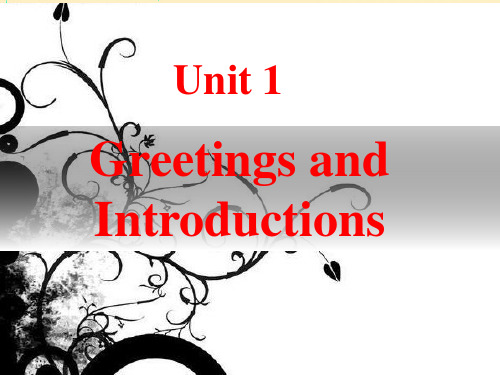
1.1 INTRODUCING YOURSELF
What
do you do when you meet someone for the first time? introduce vt.
tell who sb is when meeting for the first time Let me introduce myself. 我自我介绍一下。 May I introduce myself to you? 我来介绍一下我自己吧。
TWO KINDS OF GREETINGS
1)Formal/Informal 2)Greeting
by words/Greeting by gestures
GREETINGS(FORMAL)
How
do you do? Nice/pleased/glad to meet you. Welcome to visit!欢迎来访! I’m happy to see you. It’s great seeing you again. *用于再 次见面。
UNSPOKEN GREETINGS
•High-five
•Fist(拳头)-bump (撞击)顶拳
•Hug •Salute/ səlu:t / 敬礼
•kiss
HANDSHAKE
a. Do not shake hands absent-mindedly(心 不在焉的) b. Do not shake hands with left hand. c. Do not shake hands while wearing a hat, gloves or sunglasses. d. Do not have your other hand in your pocket. e. Do not shake hands while seated unless disabled. f. Do not refuse to shake hands with others.
BEC剑桥商务英语 Unit_1
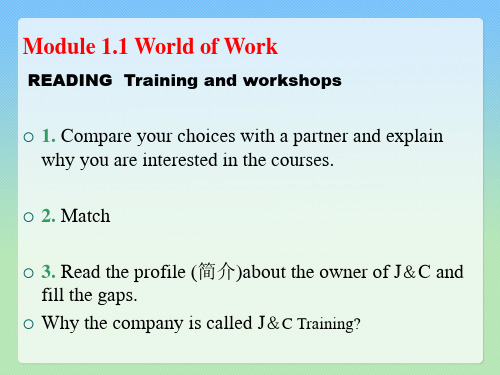
company efficiency product development mentor represent supervise scuba diving raise money audit Chronic Fatigue Syndrome detective story research and development chewing gum
5. Listen to the conversation and check your answer.
(1) May I introduce myself? (2) Nice to meet you, Ian. (3) My boss is in Sydney. (4) Do you know her? (5) She is in Singapore, too. (6) It’s a real pleasure to work with her.
Prioritize tasks Set aside one night each week for recreation Seek professional help
பைடு நூலகம்
1.2 Personal and professional details
VOCABULARY Meeting people
1. key:
1. 2. 3. 4. 5.
6.
does, produce, makes do, employ, have Do, export, ship Do, have, don’t hold Do, start, begin Does, help, doesn’t have
Grammar: Adverbs and expressions of frequency
剑桥商务英语PPT课件

11:15 收听力答题卡和试卷
下午: 13:00 口试 大致12分钟
考试评分标准
BEC preliminary听、说、读 和写四个部分。每一部分各 占25%,总分为100。 通过成绩有2个: 优秀 (pass with Merit)和通过 (pass) 未通过成绩有1个: 不及格 介绍通过率: 参加考试的学生会在7周后收 到成绩单。通过考试的学生 会在收到成绩单4周后得到考 试合格证书。
If you need to be exact you can say: ten a.m. or ten in the morning and ten p.m. or
ten at night You can also tell the time in this way: 1.00 one o’clock 3.10 ten past
• Have you got any money on you?
• Do you have any money on you?
4.商务英语考试注意事项、时间和 评分标准
考试注意事项、时间和评分标准: 1. 考试注意事项 BEC 考试: 1)请携带准考证、身份证。 2) 带2B或HB铅笔及橡皮,考试过程
注意事项
8:40 必须进考场 8:50 考官发阅读和写作答题卡并请考生确认后签名 8:55 发阅读和写作试卷并请考生填写考生姓名、中心考号和考
生考号 9:00 开始做阅读写作试卷 10:30 考官宣布停笔,收阅读和写作答题卡和试卷(阅读和写作
这60分钟既包括做题也包括把答案填到 答题卡的时间) 10:35 听力考试 (听力录音播放两遍30分钟,然后再给10分钟
Vantage Class.
1) .本课程采用经济科学出版社出版的《新编剑 桥商务英语(初\中\高级)学生用书》(第二 版)。该书的第二版是专门针对BEC商务英语 考试大纲做出更改后专门编写的,内容既与考 试相关,更与现代商务活动息息相关,对你在 商务领域大有帮助。
剑桥商务初级MODULE1

MODULE I
1.1
BUSSINESS TOPIC
World of work
READING Training and workshops I J&C Training is a company providing training for other businesses.
Look at the courses J&C Training offers and tick the ones that you find interesting. Compare with a partner and explain why the courses interest you.
or school subject C someone who advises people on a particular subject D someone who writes books or articles
MODULE I.I
BUSSINESS TOPIC
3 Read this profile about the owner of J&C and fill the gaps
BUSINESS SKILLS 1.2 Personal and professional details
2.2 Making arrangements 3.2 Company performance 4.2 Business communications 5.2 Achievements and plans
5 Our company would like some information on teambuilding weekends. ( Yes )
MODULE I.I
- 1、下载文档前请自行甄别文档内容的完整性,平台不提供额外的编辑、内容补充、找答案等附加服务。
- 2、"仅部分预览"的文档,不可在线预览部分如存在完整性等问题,可反馈申请退款(可完整预览的文档不适用该条件!)。
- 3、如文档侵犯您的权益,请联系客服反馈,我们会尽快为您处理(人工客服工作时间:9:00-18:30)。
Copyright by Judy, School of Economics and Law, HBUT
1
1-4 Basic English Skills
5-14 Listening, Speaking, Reading Writing Skills in Functional Business English Practice 15 Skills Reviewing and Reconsolidation in Simulated Business Situations Files of the Related Contents and Locations of BEC Examination
Term2, 2010-2011
be confronted with problems encounter problems hands-on experiences Ambitious Prospect Business Conference Yawning Sign Clicking Sniffing blinking, tapping your fingers
1.1 1) What do you think of the following sayings?
a. “What you don’t know won’t hurt you.” b. “No news is good news.” c. “Silence is golden.” 2) Reading the impressions of the following people and telling the class what your feelings are.(Verbal behavior and smiling) 3) Discussing the questions in B and C 4) Trying to do the fillings in D, and checking while listening; then reading aloud Question: What exactly would you say when you greet a visitor to your office? Now try to fill in the blanks with missing words before listening to the three conversations.
Letters and faxes Memos and short reports Professional journals Textbooks Long reports Contracts and legal documents Judy, School of Copyright by
Term2, 2010-2011 Economics and Law, HBUT
Economics and Law, HBUT
Copyright by Judy, School of Economics and Law, HBUT 2
Term2, 2010-2011
Objectives and content of Business English Oral Communication skills Writing business correspondence Listening: get used to different accents Reading: business news and events Cultivate Team spirit Terminal and optional aim: pass BEC2 test: advantage level
Term2, 2010-2011 Copyright by Judy, School of Economics and Law, HBUT 8
A. Vocabulary in unit 1:
Sincere Unwelcoming Appointment Efficient Aggressive Superior co-coordinator sales office head of department small talk badge Surname vice-chairman Personnel public relations Colleague Behavior Demanding Chewing Disaster Gymnastic apparently
Some words in advance
Term2, 2010-2011
Copyright by Judy, School of Economics and Law, HBUT
6
The Second Volume
Unit 1 Face to face Unit 2 Letters,faxes and memos Unit 4 Summaries, notes ,reports Unit 6 International trade Unit 7 Money matters Unit 8 Dealing with problems Unit 10 Marketing Unit 13 Jobs and careers
Some words in advance
Term2, 2010-2011
Copyright by Judy, School of Economics and Law, HBUT
3
Following presentations, lectures, or talks Following instructions Following descriptions and explanations Following training sessions
4
Letters and faxes Memos and short reports
Term2, 2010-2011
Copyright by Judy, School of Economics and Law, HBUT
5
My requirements: Study in advance: listening Finish homework: writing Participating in class: teamwork Final test: Model BEC2 test paper
10
A. Vocabulary in unit 1:
Syllable Offence Demonstration Counterparts Aperitif Tricky Generate I spent a very hectic Sunday. 我度过了一 个忙乱的星期天 tackle a job trouble shooting back-up data loose cable
Term2, 2010-2011 Copyright by Judy, School of Economics and Law, HBUT 7
*
Basic Skills and Techniques for Talking to People in Business Situations social functions of English: In business, people may be dealing with all kinds of people in English: clients/customers and colleagues/co-workers, friends and strangers, superiors and subordinates, suppliers, visitors and members of the public organizations --- all of whom may be friends, strangers or acquaintances --- people of your age, or people who are younger or older than you, all of whom you have to be talked to in different ways. Your first impression on them the way you behave functions fundamentally in your career.
How do you do? Pleased to meet you. Formal ways of greeting at first meeting: Glad to know you. Nice to meet you. Good afternoon! Informal ways of greeting at first meeting: Hello! Hello!/Hi! Hi! Afternoon/Good afternoon How are you? Ways of greeting between acquaintances: How is everything? 14 Copyright by Judy, School of How are you doing? Term2, 2010-2011
Copyright by Judy, School of Economics and Law, HBUT 11
B. Finding more vocabulary of describing people:
Calm Honest skillful Sophisticated Helpful Intelligent Nice Optimistic indifferent Sleepy Unclear Lazy Clumsy Stupid Prejudiced Inefficient Nasty Unhelpful off-hand Rude Pessimistic Detached in-cooperative self-centered Conservative high- qualified etc.
